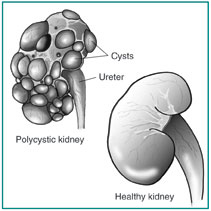 Kidney cysts are fluid-
Kidney cysts are fluid-
Simple Kidney Cysts
The most common form of kidney cyst is called a “simple kidney cyst.” This is a kidney cyst that forms without any significant accompanying or causative condition being present. The causes of simple kidney cysts are unclear. They are normally asymptomatic and are detected in the course of a medical imaging test being conducted for some other reason. Complications from simple kidney cysts are rare, and generally no treatment is required.
Polycystic Kidney Disease
Polycystic kidney disease results in different and more numerous cysts forming on the kidneys (and sometimes other parts of the body). Polycystic kidney disease is a genetic disorder. It afflicts an estimated 1 to 2 per 1,000 live births. The cysts begin to form in utero and formation continues after birth. Polycystic kidney disease is the most common potentially life-
Kidney Cancer
What appears to be a kidney cyst may in some cases actually be a kidney cancer. If cancer is suspected, a kidney biopsy is normally conducted as a follow-
Symptoms
Most of the time, simple kidney cysts don’t have symptoms other than the cysts themselves. When a cyst grows particularly large, however, they can lead to dull pain the back or side, and sometimes to fever.
Causes And Risk Factors
The cause of simple kidney cysts is not clear. One theory is that the cysts form when the surface membrane of the kidney weakens and develops a pouch (diverticulum). The pouch fills with fluid which causes it to expand in size and eventually detach from the kidney.
There are no obvious identifiable risk factors associated with simple kidney cysts. The likelihood of them developing increases with age. An estimated 27% of people over age 50 have simple kidney cysts that cause no symptoms and require no treatment. Polycystic kidney disease is a genetic abnormality and, apart from a family history of the condition, there are no risk factors for this disease.
Complications
Normally, simple kidney cysts are not dangerous and develop no complications. On rare occasions, however, a kidney cyst can become infected. This produces pain and fever and should be treated as potentially dangerous. The infection is normally bacterial and responds to treatment with antibiotics.
A cyst that bursts can produce severe pain in the back or side. Depending on the size and position, a cyst may obstruct urinary flow, leading to swelling of the kidneys and other complications associated with urinary tract obstruction.
Treatment
Any cyst may be surgically drained. However, in most cases this treatment isn’t warranted with simple kidney cysts. The cysts in most cases are asymptomatic and cause no complications, and the risks involved in surgical treatment far outweigh the potential benefits. If a cyst is causing complications such as obstruction of urinary flow, a doctor may recommend draining it. An infected cyst needs to be treated with antibiotics and sometimes should be drained as well.
